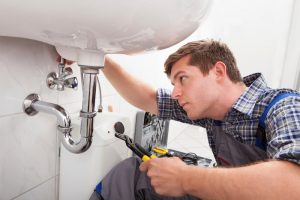 If you’ve lived through even one winter around here, then you know how bitterly cold it gets. With that drop in the temperature comes an unfortunately common winter enemy—frozen plumbing. And, frozen pipes can result in a good amount of damage if not addressed. As water in your pipes freezes, it expands and puts pressure on the walls of the pipes, leading to leaks or even ruptured pipes.
If you’ve lived through even one winter around here, then you know how bitterly cold it gets. With that drop in the temperature comes an unfortunately common winter enemy—frozen plumbing. And, frozen pipes can result in a good amount of damage if not addressed. As water in your pipes freezes, it expands and puts pressure on the walls of the pipes, leading to leaks or even ruptured pipes.
To protect your plumbing from this fairly common wintertime problem, there are a few steps you can take. Read on the learn more about what you can do. And if you discover any issues with your plumbing as we progress into fall and approach winter, be sure to contact a professional plumber in Des Plaines, IL, such as any member of our team!
How to Prevent Frozen Pipes
The first thing you can do to avoid frozen pipes is open your outdoor faucets. Naturally, these are the pipes that are going to be most susceptible to freezing. Be sure to also turn off the water flow to these faucets, whether you use them for sprinklers or hoses or any other outdoor application.
Leave the faucets open even after you’ve let all the water drain from them. You might even consider putting insulated caps on your hose and faucet openings as an added layer of protection. Once you’ve done this, we advise you to:
Disconnect Any Hoses: You likely have hoses you use outdoors during the warmer parts of the year. Before temperatures drop too low, disconnect them, let them drain, and then store them indoors.
Insulate Pipes: There are various pipes throughout your home that could be vulnerable to freezing temperatures, but you still need to use during the winter. Meaning, these are attached to faucets that you can’t just drain and turn off the water supply too—like under-sink pipes, pipes in your basement, or pipes running through your crawlspace.
In order to adequately protect this section of plumbing during the winter, you’ll want to invest in some pipe insulating sleeves, which you can pick up from your local hardware store. This helps keep the temperature of the water in your pipes from dropping too low. You may actually be able to accomplish this with towels, if you’d rather go this route.
Keep Your Cabinets Open: You may be a little confused about this tip, but stick with us! Plumbing fixtures within your bathrooms or kitchen are usually under your sinks or run behind the walls that lead outside. This makes these particular pipes sensitive to freezing. However, leaving your cabinets where these pipe are open will help the warmth from your heater reach them, and make them less likely to freeze.
Help! My Pipes Froze Anyway
Unfortunately, this can happen—especially after a few consecutively cold days below 30 degrees. If this happens, the first thing you should do is contact our pros. We don’t advise trying to unfreeze the pipes yourself, as this can cause more harm than good. Plus, it can cause injury—pipes can burst as they are thawing, due to pressure buildup.
For expert plumbing service, installations, or maintenance contact Reliance Plumbing Sewer & Drainage, Inc. Our knowledgeable plumbers serve the North Shore and Northwest Chicago suburbs. Rely on Reliance!
